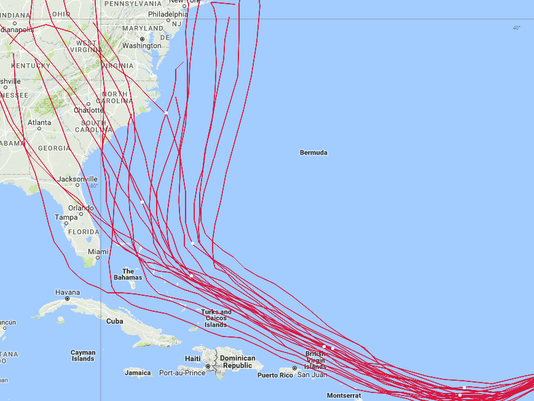Even as the devastating effects from Hurricane Harvey in the Gulf Coast are still being calculated, a very strong hurricane, Irma, is tracking toward the U.S., and possibly North Carolina.

People up and down the East Coast are preparing for a possible hit by Hurricane Irma. Farmers are preparing, too. (NOAA image from 9/3)
Forecasts like these rightly generate concern. Flooding is the biggest, given it is how most lives are lost. But hurricanes also raise concern about loss or damage to homes and crops, as well as other immediate effects such as power outages.
Some activists like to sound false alarms about pollution from hog farms. (And some in the media will bite.) The facts are much different.
Just last year, when Hurricane Matthew dropped more than 16 inches of rain across North Carolina, it caused some of the worst flooding our state has ever seen. And yet hog farms fared remarkably well.
Only one hog farm lost any animals because of the storm. And only one hog lagoon, located on an inactive farm, suffered structural damage.
More than 99.5% of North Carolina hog lagoons didn’t experience any flooding as a result of the hurricane.
When it comes to possible pollution, a much greater threat comes from municipal wastewater treatment plants. During Matthew, multiple municipal plants were flooded and millions of gallons of waste were released into the waters of the state.
State regulators note that the massive volume of rainfall associated with storms has a dilutive effect on the many sources of pollution that end up in the waters.
Still, North Carolina pig farmers are not resting easy.
Our farmers have learned valuable lessons from past hurricanes and taken meaningful steps to better prepare for future hurricanes. Since Hurricane Floyd hit North Carolina in 1999, more than 100 farms in flood-prone areas — and more than 200 lagoons — have been closed.
The N.C. Pork Council is currently working to help secure funding that would voluntarily close additional farms that could be susceptible to flooding.
During Hurricane Matthew, our farmers came together to help those in need. When necessary, we moved animals to higher ground, delivered feed to farms only accessible by boat, and provided fuel to those without power. We took steps to secure lagoons.
Those actions allowed our farms to protect their animals — and our environment — under incredibly challenging conditions.
We hope and pray that no hurricane delivers that same punch.
But if one does, you can rest assured that our farmers are prepared.
— Andy Curliss, CEO
